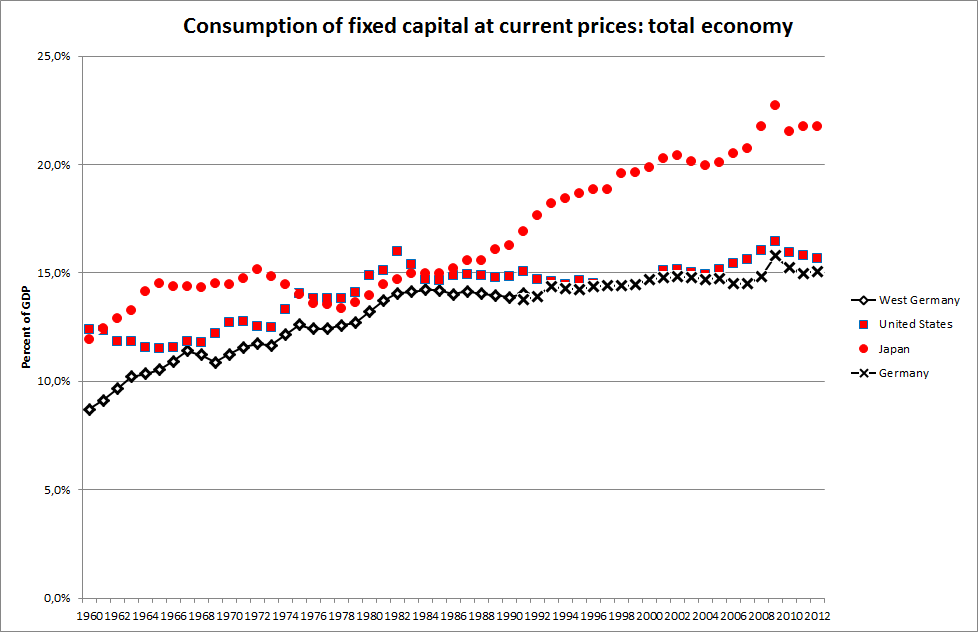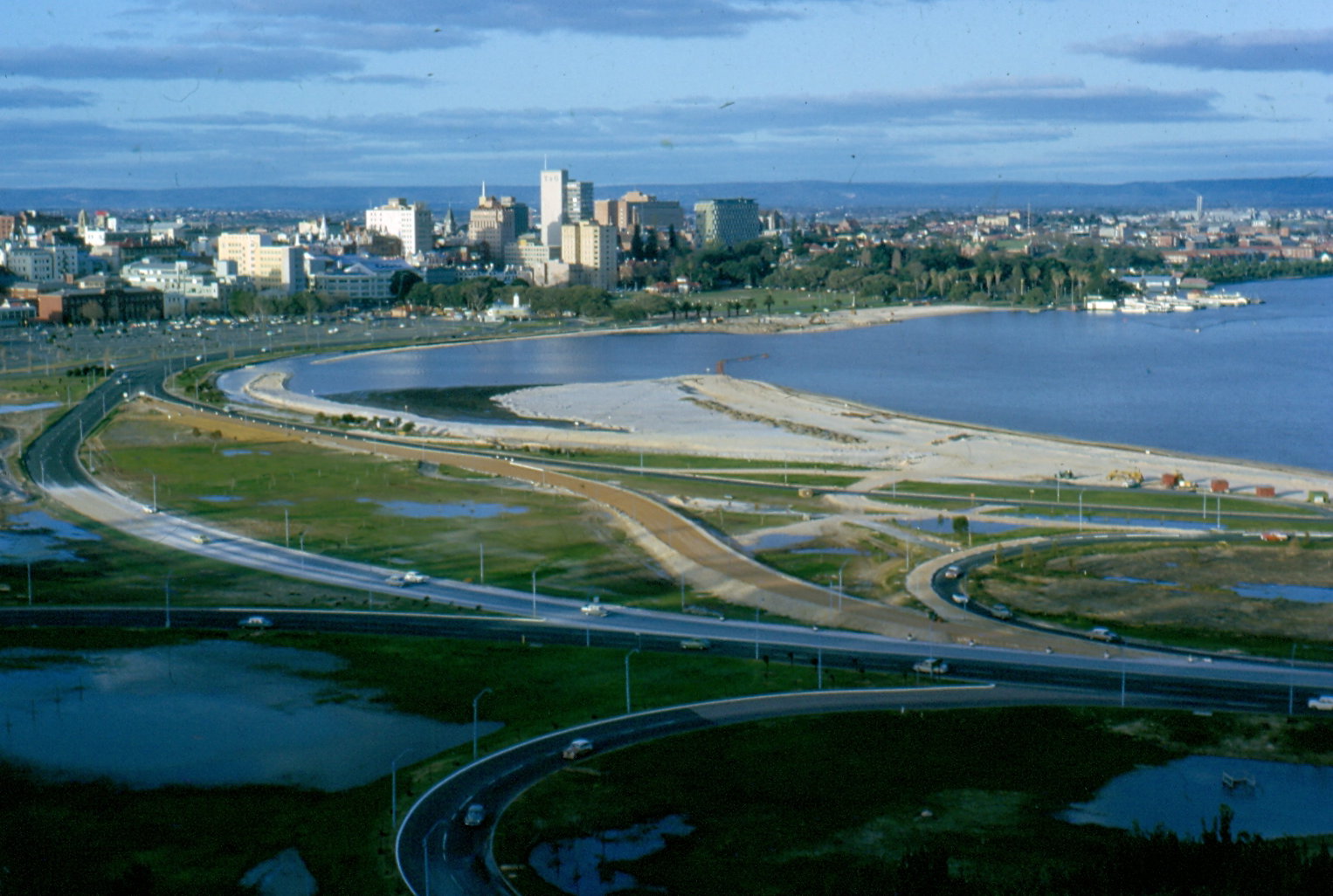|
Gross Fixed Capital Formation
Gross fixed capital formation (GFCF) is a component of the expenditure on gross domestic product (GDP) that indicates how much of the new value added in an economy is invested rather than consumed. It measures the value of acquisitions of new or existing fixed assets by the business sector, governments, and "pure" households (excluding their unincorporated enterprises) minus disposals of fixed assets. GFCF is a macroeconomic concept used in official national accounts such as the United Nations System of National Accounts (UNSNA), National Income and Product Accounts (NIPA), and the European System of Accounts (ESA). The concept dates back to the National Bureau of Economic Research (NBER) studies of Simon Kuznets of capital formation in the 1930s, and standard measures for it were adopted in the 1950s. GFCF is called "gross" fixed capital formation because the measure does not make any adjustments to deduct the consumption of fixed capital (depreciation of fixed assets) from ... [...More Info...] [...Related Items...] OR: [Wikipedia] [Google] [Baidu] |
Consumption Of Fixed Capital
Consumption of fixed capital (CFC) is a term used in business accounts, tax assessments and national accounts for depreciation of fixed assets. CFC is used in preference to "depreciation" to emphasize that fixed capital is used up in the process of generating new output, and because unlike depreciation it is not valued at historic cost but at current market value (so-called "economic depreciation"); CFC may also include other expenses incurred in using or installing fixed assets beyond actual depreciation charges. Normally the term applies only to ''producing'' enterprises, but sometimes it applies also to real estate assets. CFC refers to a depreciation charge (or "write-off") against the gross income of a producing enterprise, which reflects the decline in value of fixed capital being operated with. Fixed assets will decline in value after they are purchased for use in production, due to wear and tear, changed market valuation and possibly market obsolescence. Thus, CFC represe ... [...More Info...] [...Related Items...] OR: [Wikipedia] [Google] [Baidu] |
Recession
In economics, a recession is a business cycle contraction that occurs when there is a period of broad decline in economic activity. Recessions generally occur when there is a widespread drop in spending (an adverse demand shock). This may be triggered by various events, such as a financial crisis, an external trade shock, an adverse supply shock, the bursting of an economic bubble, or a large-scale Anthropogenic hazard, anthropogenic or natural disaster (e.g. a pandemic). There is no official definition of a recession, according to the International Monetary Fund, IMF. In the United States, a recession is defined as "a significant decline in economic activity spread across the market, lasting more than a few months, normally visible in real GDP, real income, employment, industrial production, and wholesale-retail sales." The European Union has adopted a similar definition. In the United Kingdom and Canada, a recession is defined as negative economic growth for two consecutive qu ... [...More Info...] [...Related Items...] OR: [Wikipedia] [Google] [Baidu] |
Uncertainty
Uncertainty or incertitude refers to situations involving imperfect or unknown information. It applies to predictions of future events, to physical measurements that are already made, or to the unknown, and is particularly relevant for decision-making. Uncertainty arises in partially observable or stochastic environments, as well as due to ignorance, Laziness, indolence, or both. It arises in any number of fields, including insurance, philosophy, physics, statistics, economics, finance, medicine, psychology, sociology, engineering, metrology, meteorology, ecology and information science. Concepts Although the terms are used in various ways among the general public, many specialists in decision theory, statistics and other quantitative fields have defined uncertainty, risk, and their measurement as: Uncertainty The lack of certainty, a state of limited knowledge where it is impossible to exactly describe the existing state, a future outcome, or more than one possible outcome. ... [...More Info...] [...Related Items...] OR: [Wikipedia] [Google] [Baidu] |
Economic Growth
In economics, economic growth is an increase in the quantity and quality of the economic goods and Service (economics), services that a society Production (economics), produces. It can be measured as the increase in the inflation-adjusted Output (economics), output of an economy in a given year or over a period of time. The rate of growth is typically calculated as List of countries by real GDP growth rate, real gross domestic product (GDP) growth rate, List of countries by real GDP per capita growth, real GDP per capita growth rate or List of countries by GNI per capita growth, GNI per capita growth. The "rate" of economic growth refers to the Exponential growth, geometric annual rate of growth in GDP or GDP per capita between the first and the last year over a period of time. This growth rate represents the trend in the average level of GDP over the period, and ignores any fluctuations in the GDP around this trend. Growth is usually calculated in "real" value, which is real v ... [...More Info...] [...Related Items...] OR: [Wikipedia] [Google] [Baidu] |
Territory
A territory is an area of land, sea, or space, belonging or connected to a particular country, person, or animal. In international politics, a territory is usually a geographic area which has not been granted the powers of self-government, i.e. an area that is under the jurisdiction of a sovereign state. As a subdivision, a territory in most countries is an organized division of an area that is controlled by a country but is not formally developed into, or incorporated into, a political unit of that country, which political units are of equal status to one another and are often referred to by words such as "provinces", "regions", or "states". In its narrower sense, it is "a geographic region, such as a colonial possession, that is dependent on an external government." Etymology The origins of the word "territory" begin with the Proto-Indo-European root ''ters'' ('to dry'). From this emerged the Latin word ''terra'' ('earth, land') and later the Latin word ''territorium'' ... [...More Info...] [...Related Items...] OR: [Wikipedia] [Google] [Baidu] |
Polder
A polder () is a low-lying tract of land that forms an artificial hydrology, hydrological entity, enclosed by embankments known as levee, dikes. The three types of polder are: # Land reclamation, Land reclaimed from a body of water, such as a lake or the seabed # Floodplain, Flood plains separated from the sea or river by a dike # Marshes separated from the surrounding water by a dike and subsequently drained; these are also known as ''koogs'', especially in Germany The ground level in drained marshes subsidence, subsides over time. All polders will eventually be below the surrounding water level some or all of the time. Water enters the low-lying polder through infiltration (hydrology), infiltration and water pressure of groundwater, or rainfall, or transport of water by rivers and canals. This usually means that the polder has an excess of water, which is pumped out or drained by opening sluices at low tide. Care must be taken not to set the internal water level too low. Pold ... [...More Info...] [...Related Items...] OR: [Wikipedia] [Google] [Baidu] |
Land Reclamation
Land reclamation, often known as reclamation, and also known as land fill (not to be confused with a waste landfill), is the process of creating new Terrestrial ecoregion, land from oceans, list of seas, seas, Stream bed, riverbeds or lake beds. The land reclaimed is known as reclamation ground, reclaimed land, or land fill. History In ancient Egypt, the rulers of the Twelfth Dynasty of Egypt, Twelfth Dynasty (c. 2000–1800 BC) undertook a far-sighted land reclamation scheme to increase agricultural output. They constructed levees and canals to connect the Faiyum Oasis, Faiyum with the Bahr Yussef waterway, diverting water that would have flowed into Lake Moeris and causing gradual evaporation around the lake's edges, creating new farmland from the reclaimed land. A similar land reclamation system using dams and drainage canals was used in the Greek Lake Copais, Copaic Basin during the Middle Helladic period, Middle Helladic Period (c. 1900–1600 BC). Another early large-s ... [...More Info...] [...Related Items...] OR: [Wikipedia] [Google] [Baidu] |
Land Improvement
Land development is the alteration of landscape in any number of ways, such as: * Changing landforms from a natural or semi-natural state for a purpose such as agriculture or housing * Subdividing real estate into lots, typically for the purpose of building homes * Real estate development or changing its purpose, for example by converting an unused factory complex into a condominium History Land development has a history dating to Neolithic times around 8,000 BC. From the dawn of civilization, the process of land development has elaborated the progress of improvements on a piece of land based on codes and regulations, particularly housing complexes. Economic aspects In an economic context, land development is also sometimes advertised as land improvement or land amelioration. It refers to investment making land more usable by humans. For accounting purposes, it refers to any variety of projects that increase the value of the process. Most are depreciable, but some land improv ... [...More Info...] [...Related Items...] OR: [Wikipedia] [Google] [Baidu] |
Capital (economics)
In economics, capital goods or capital are "those durable produced goods that are in turn used as productive inputs for further production" of goods and services. A typical example is the machinery used in a factory. At the macroeconomic level, "the nation's capital stock includes buildings, equipment, software, and inventories during a given year." The means of production is as a "... series of heterogeneous commodities, each having specific technical characteristics ..." "capital goods", are one of the three types of intermediate goods used in the production process, the other two being land and labour. The three are also known collectively as "primary factors of production". This classification originated during the classical economics period and has remained the dominant method for classification. Capital can be increased by the use of a production process (see production function and factors of production). Outputs of the production process are normally classif ... [...More Info...] [...Related Items...] OR: [Wikipedia] [Google] [Baidu] |
Intermediate Consumption
Intermediate consumption (also called "intermediate expenditure") is an economic concept used in national accounts, such as the United Nations System of National Accounts (UNSNA), the US National Income and Product Accounts (NIPA) and the European System of Accounts (ESA). Conceptually, the aggregate "intermediate consumption" is equal to the amount of the difference between gross output (roughly, the total sales value) and net output (gross value added or GDP). In the US economy, total intermediate consumption represents about 45% of gross output. The services component in intermediate consumption has grown strongly in the US, from about 30% in the 1980s to more than 40% today. Thus, intermediate consumption is an accounting flow which consists of the total monetary value of goods and services ''consumed or used up as inputs in production'' by enterprises, including raw materials, services and various other operating expenses. Because this value must be subtracted from gros ... [...More Info...] [...Related Items...] OR: [Wikipedia] [Google] [Baidu] |





